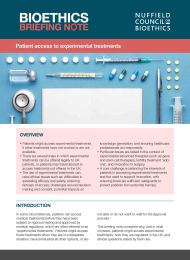Patient access to experimental treatments
Policy Briefing
Published 20/11/2018

Access to experimental treatments in different contexts
How patients access or are offered experimental treatments varies in different areas of healthcare. Below are some examples.
Advanced therapies
Advanced therapies, such as stem cell and gene therapies, is a developing area of research. Treatments in the pipeline are often aimed at conditions for which there is currently no effective cure, such as some cancers, multiple sclerosis, and muscular dystrophy. Some advanced therapies have already been approved and are available to NHS patients, but they are mostly offered on a small scale bespoke basis to individuals and in research contexts. These therapies can be highly expensive to develop, to bring to market and, once approved, to provide to patients.
UK patients can access experimental advanced therapies in other countries such as the US, Australia, and Germany.* Different regional or national authorities might apply different standards of evidence before a treatment is approved. UK regulators have no power over clinics outside the jurisdictions of the UK, and are limited in the ways they can support patients travelling abroad for treatment. Concerns have been raised about the marketing practices of unregulated and sometimes unscrupulous clinics, the influence of overly optimistic media reports, and public campaigns for access to very early-stage therapies.**
Fertility treatment
Within the private fertility treatment sector, patients are increasingly offered ‘add-ons’ alongside their main fertility treatment with the aim of improving the chance of a successful pregnancy. There are strong incentives for patients to consider add-ons to maximise their chance of conceiving, given the cost and emotional and physical stress of fertility treatment.
Typically, add-ons cost between £50 and £8,000. There is limited evidence to support their use. Over 70% of fertility clinics in the UK offer add-ons which have been rated by the Human Fertilisation and Embryology Authority as having insufficient or no evidence to show that they are effective and safe. A recent study found that some clinics in the UK provide misleading or inconsistent information about the available evidence for add-ons.
Surgery
There is a strong culture of innovation in surgery. The Royal College of Surgeons emphasises that the use of surgical techniques that deviate significantly from established practice must be underpinned by rigorous clinical governance processes.45
However, it has been reported that surgical procedures are frequently used without first being tested in clinical trials, and with no long-term followup of patients, systematic outcome reporting or information sharing. There is a lack of systematic oversight of new surgical procedures in NHS hospitals. There have been cases of patients not being informed that the surgical procedure they are being offered is non-routine.***
Testing surgical procedures in traditional clinical trial models can face both practical and ethical challenges. There is a lack of clarity about what constitutes a new intervention and what is a modification. Initiatives such as the IDEAL Collaboration are seeking to create a framework for surgical innovation and encourage systematic outcome reporting as a professional duty for surgeons.
References
For a full list of references, download the PDF.
* See, for example, Newman M (2018) Is cancer fundraising fuelling quackery? BMJ 362: k3829; Sipp D, et al. (2017) Marketing of unproven stem cell-based interventions: a call to action Sci Transl Med 9:397.
** See, for example, Piga MA (2014) About patients, inventors, journalists, scientists, and IRBs (to say nothing of the institutions): CCSVI and MS Med Law 33: 177; Turner L (2018) Direct-to-consumer marketing of stem cell interventions by Canadian businesses Regen Med Epub ahead of print; Das R (2018) Populist discourse on a British social media patient-support community: The case of the Charlie Gard support campaign on Facebook Discourse, Context & Media 24: 76-84.
*** See, for example, Memorandum by the Oxford Radcliffe Hospitals NHS Trust (PS 102) to the Health Committee inquiry into patient safety; Blazeby and McNair stress that what patients are told about innovative surgery is generally unknown: Blazeby JM and McNair AGK (2011) Commentary: talking to patients about surgical innovations BMJ 342.

Share